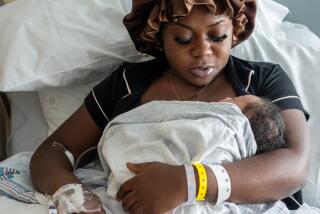Ethiopian tales of loss and renewal
- Share via
“A Walk to Beautiful,” a new documentary opening Friday, focuses on five poor Ethiopian women who have suffered traumatic childbirth injuries.
After enduring sometimes more than a week in labor, these women delivered stillborn babies that left them with obstetric fistula, a hole in the birth canal that causes incontinence. Abandoned by their husbands, shunned by their families and villages, they live in shame and in hiding.
The film chronicles how their lives change at the Addis Ababa Fistula Hospital, where corrective surgeries have been performed since 1974. The hospital performs 1,200 fistula surgeries a year, free of charge.
“The poorest countries in the world have the highest rates of fistula,” says director Mary Olive Smith. “Nigeria has the highest rate. It’s primarily in South Africa and Southeast Asia. There’s a lot less in Latin America, even when there is severe poverty. They think the main reason is that there are roads [in the villages], so you can get a woman to hospitals even if they are not close.”
With about 2 million women suffering from fistula, Smith is hoping her film will raise awareness not only of this problem but also of other difficulties women in these countries face -- forced labor, malnutrition and lack of decent prenatal care. Many are forced into marriage before puberty.
Because these women’s lives are so alien to the Western world, Smith was determined to find subjects with whom the audience could connect.
“We found women you could really connect to on a personal level,” she explained, “so it’s not an abstract statistic. You could sit around and drink a cup of coffee with these women and share.”
Among the women profiled are 25-year-old Ayehu, who lived in a ramshackle shack with her young daughter behind her mother’s house; the twentysomething Almaz, who was already at the Fistula Hospital, had been abducted by her now-husband while at a village market and suffers from a double fistula; and Zewdie, 38, a mother of five who suffered a fistula after the stillbirth of her sixth child.
Smith says it was easier than she anticipated to get these women to participate. “They were so desperate to be heard,” she says. “Even though they were ashamed, they really couldn’t stop talking.”
-- Susan King
More to Read
Sign up for Essential California
The most important California stories and recommendations in your inbox every morning.
You may occasionally receive promotional content from the Los Angeles Times.














